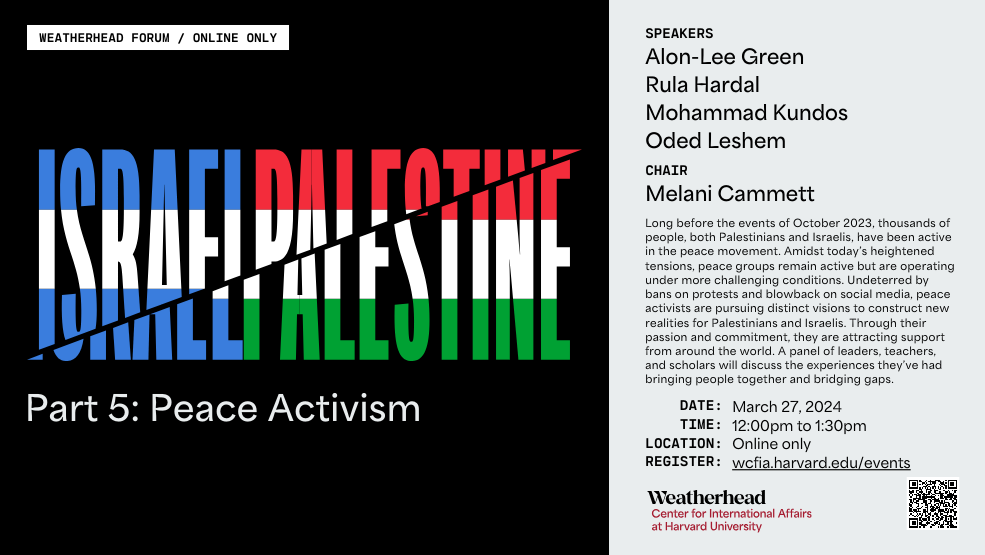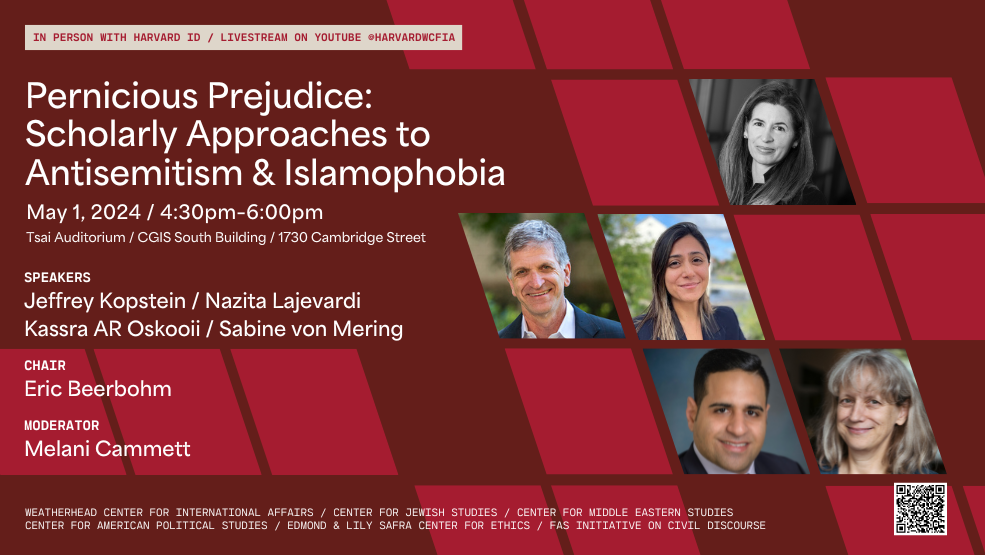
In our Weatherhead series on Israel/Palestine, we bring together scholars across disciplines and with different perspectives to better understand the dimensions of this conflict. Our series aims to address current and historical events, polarization, potential resolutions, the humanitarian response, implications for the region, the role of US foreign policy, and more.
All events in this online series are chaired by Melani Cammett, Weatherhead Center Director and Clarence Dillon Professor of International Affairs, Department of Government, Harvard University.
In the News
- "Weatherhead Center Encourages Informed Discussion Over Israel-Palestine Conflict," The Harvard Crimson
- "Examining Issues around Possible Solutions to Israel-Hamas War," The Harvard Gazette
- "Looking at Causes, Measuring Effects of Israel-Hamas War," The Harvard Gazette
- "'What We Really Need Is Just to Sit Together and Face Each Other'," The Harvard Gazette
- "Can Colleges Foster Civil Discourse?," The Chronicle of Higher Education
-
"Finding Middle Way Out of Gaza War," The Harvard Gazette
Part 1: A Primer
Wednesday, December 4, 2023 / 12:00–1:30pm ET
How did tensions between Palestinians and Israelis reach the devastating breaking point of October 7? Our panelists will offer crucial background on recent history and events leading up to the attack on Israel and the war in Gaza. This forum will follow along the lines of a “teach-in” to educate and review what is known about the current situation—with the shared value of conveying compassion rather than blame. Scholars of Israel, Palestine, and the Middle East will share their insights on the forces that have shaped the war and how it is experienced on the ground.
Speakers:
- Derek Penslar, Faculty Associate. William Lee Frost Professor of Jewish History, Department of History; Director, Center for Jewish Studies, Harvard University.
- Yael Berda, Former Academy Scholar, The Harvard Academy for International and Area Studies. Fellow, Middle East Initiative, Harvard Kennedy School; Senior Lecturer (Associate Professor), Department of Sociology and Anthropology, The Hebrew University of Jerusalem.
- Amahl Bishara, Associate Professor, Anthropology; Associate Professor, Studies in Race, Colonialism, and Diaspora, Department of Anthropology, Tufts University.
Part 2: Scenarios for Peace
Wednesday, January 31, 2024 / 12:00–1:30pm ET
The eruption of war between Israel and Hamas pushes the critical questions of sovereignty to the forefront. Scenarios for peace that have long been discarded—such as a two-state solution—are now being reconsidered. So are other scenarios, such as citizenship under one state, or a confederation of states under Israel, to name a few. How can citizens of Palestine and Israel live together safely, and what kind of governing structure could be viable in Gaza and the West Bank, or collectively? Our scholars discuss theoretical proposals for peaceful coexistence.
Speakers:
- Leila Farsakh, Professor, Department of Political Science, University of Massachusetts, Boston.
- Yuval Feinstein, Former Visiting Scholar, Weatherhead Scholars Program. Chair; Associate Professor, Department of Sociology, University of Haifa.
- Shai Feldman, Raymond Frankel Chair in Israeli Politics and Society, Crown Center for Middle East Studies and Raymond Frankel Professor of Politics at Brandeis University.
Part 3: Geopolitical Dimensions
Wednesday, February 14, 2024 / 10:00–11:30am ET
As regional actors beyond Israel and Hamas are drawn into the conflict, stability across the Middle East is increasingly uncertain. Alliances are shifting, proxy wars are intensifying, and commercial ships are being diverted away from the Red Sea following attacks by Houthi rebels. Caught among different actors clamoring for their support, the United States and other nations and regional alliances must stake their positions based on various and differing grounds, be they humanitarian, security, economic, or strategic.
Four scholars will discuss and debate the volatile and fluctuating state of relations within the Middle East and the broader geopolitical ramifications of this heightened, century-long conflict.
Speakers:
- F. Gregory Gause, Professor of International Affairs and John H. Lindsey ’44 Chair, Bush School of Government & Public Service, Texas A&M University.
- Peter Krause, Associate Professor of Political Science, Boston College.
- Adel Hamaizia, Research Fellow, Middle East Initiative, Belfer Center, Harvard Kennedy School.
- Dahlia Sheindlin, public opinion expert and political analyst; PhD, Tel Aviv University.
Part 4: A Dialogue
Friday, February 16, 2024 / 12:00–1:15pm ET
How do two prominent philosophers—one Palestinian, one Israeli—think about the war in Gaza, the October 7 attack, the Israeli-Palestinian conflict, and prospects for the future? Can philosophical reflection contribute to our understanding of the crisis in the Middle East? Harvard political philosopher Michael Sandel moderates a discussion between Sari Nusseibeh, a renowned Palestinian philosopher and former president of Al Quds University who has been active in Palestinian politics and peacemaking initiatives, and Moshe Halbertal, a distinguished professor of Jewish thought and philosophy at Hebrew University and Gruss Professor of Law at NYU Law School.
Speakers:
- Moshe Halbertal, Gruss Professor of Law, New York University School of Law; John and Golda Cohen Professor of Jewish Thought and Philosophy, Hebrew University of Jerusalem.
- Sari Nusseibeh, professor of philosophy, emeritus; former president, Al Quds University; former representative of the Palestinian National Authority in Jerusalem.
Moderator:
-
Michael Sandel, Faculty Associate. Anne T. and Robert M. Bass Professor of Government, Department of Government, Harvard University.
Part 5: Peace Activism
Wednesday, March 27, 2024 / 12:00–1:30pm ET

Long before the events of October 2023, thousands of people, both Palestinians and Israelis, have been active in the peace movement. Amidst today’s heightened tensions, peace groups remain active but are operating under more challenging conditions. Undeterred by bans on protests and blowback on social media, peace activists are pursuing distinct visions to construct new realities for Palestinians and Israelis. Through their passion and commitment, they are attracting support from around the world. A panel of leaders, teachers, and scholars will discuss the experiences they’ve had bringing people together and bridging gaps.
Speakers:
- Alon-Lee Green, National Co-Director, Standing Together.
- Rula Hardal, Palestinian CEO, A Land for All.
- Mohammad Kundos, Principal, Hand in Hand School, Kfar Saba, Israel.
- Oded Leshem, Senior Research Associate, Psychology of Intergroup Conflict and Conciliation Lab, Hebrew University.
Pernicious Prejudice: Scholarly Approaches to Antisemitism and Islamophobia (In Person)
Wednesday, May 1, 2024 / 4:30–6:00pm ET

This in-person event is part of the Faculty of Arts and Sciences Civil Discourse Initiative. It will be livestreamed and available for viewing on our YouTube Channel.
The panel will focus on how leading social scientists conceptualize, measure, and study key forms of prejudice in the US context, focusing specifically on antisemitism and Islamophobia. The event will bring together top scholars who are at the forefront of studying these important and pernicious phenomena using rigorous, evidence-based data, methods, and sources.
Speakers:
- Jeffrey Kopstein, Director, Center for Jewish Studies; Professor, Department of Political Science, University of California, Irvine.
- Nazita Lajevardi, Associate Professor, Department of Political Science, Michigan State University.
- Kassra A.R. Oskooii, Associate Professor, Department of Political Science and International Relations, University of Delaware.
- Sabine von Mering, Director, Center for German and European Studies; Professor of German and Women's, Gender, and Sexuality Studies, Brandeis University.
Chair:
- Eric Beerbohm, Professor of Government; Director, Edmond & Lily Safra Center for Ethics, Harvard University.
Moderator:
-
Melani Cammett, Center Director; Chair, Weatherhead Research Cluster on Identity Politics. Clarence Dillon Professor of International Affairs, Department of Government, Harvard University.
